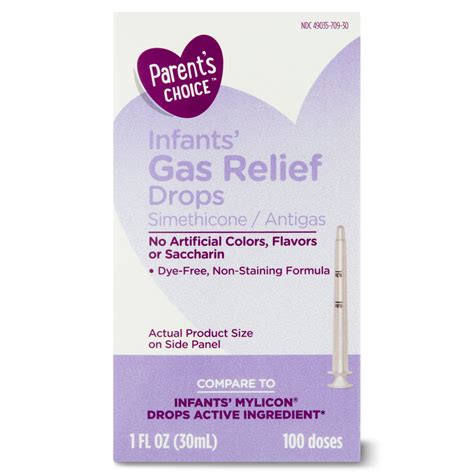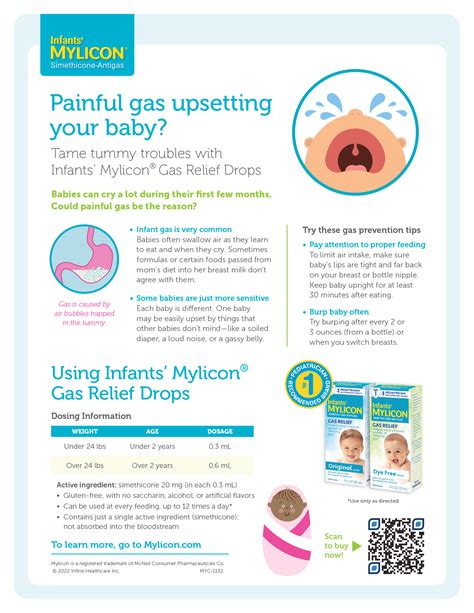Intro
Find instant relief for infant gas with our expert guide, covering symptoms, causes, and remedies, including natural gas relief methods and products to soothe colic and discomfort in babies.
Infant gas relief is a topic of great importance for many parents, as gas and bloating can cause significant discomfort and distress for young babies. Gas is a common issue in infants, and it can be caused by a variety of factors, including swallowing air during feeding, eating certain foods, and having an underdeveloped digestive system. When gas builds up in an infant's stomach, it can lead to symptoms such as bloating, abdominal pain, and fussiness. In severe cases, gas can even lead to more serious issues, such as reflux and colic.
Understanding the causes of infant gas is crucial for finding effective relief. One of the main causes of gas in infants is swallowing air during feeding. This can happen when a baby is not latched on properly to the breast or bottle, or when they are fed too quickly. Another common cause of gas is the introduction of new foods, particularly those that are high in fiber or sugar. Some babies may also be more prone to gas due to an underdeveloped digestive system or food sensitivities. By identifying the underlying cause of gas, parents can take steps to alleviate their baby's discomfort and promote healthy digestion.
Finding effective relief for infant gas can be a challenge, but there are several strategies that can help. One of the most effective ways to relieve gas is to use gentle massage techniques, such as the "bicycle" method, where the baby's legs are moved in a cycling motion to help release trapped gas. Another approach is to use over-the-counter gas drops, which can help to break down gas bubbles in the stomach and relieve discomfort. Additionally, parents can try using a warm bath or a heating pad to help soothe their baby's stomach and promote relaxation. By trying out these different approaches, parents can find what works best for their baby and help to alleviate their discomfort.
Understanding Infant Gas

Infant gas is a complex issue, and there are many factors that can contribute to its development. One of the main factors is the type of feeding, as breastfed babies tend to have less gas than formula-fed babies. This is because breast milk is easier to digest, and it contains enzymes that help to break down proteins and fats. On the other hand, formula-fed babies may experience more gas due to the presence of cow's milk proteins and other ingredients that can be difficult to digest. Additionally, the way a baby is fed can also impact gas, as feeding too quickly or not burping properly can lead to swallowing air and increased gas.
Causes of Infant Gas
There are several causes of infant gas, including: * Swallowing air during feeding * Eating certain foods, such as beans or broccoli * Having an underdeveloped digestive system * Food sensitivities or allergies * Constipation or slow bowel movements By understanding these causes, parents can take steps to prevent and alleviate gas in their babies.Signs and Symptoms of Infant Gas

The signs and symptoms of infant gas can vary, but common indicators include:
- Fussiness or irritability
- Abdominal pain or discomfort
- Bloating or swelling of the stomach
- Passing gas or having a bowel movement
- Arching the back or drawing up the legs
- Refusal to feed or eat By recognizing these signs and symptoms, parents can take action to relieve their baby's discomfort and promote healthy digestion.
Relieving Infant Gas
There are several ways to relieve infant gas, including: * Using gentle massage techniques, such as the "bicycle" method * Trying over-the-counter gas drops * Using a warm bath or heating pad to soothe the stomach * Adjusting feeding techniques, such as burping more frequently or feeding in an upright position * Avoiding certain foods or ingredients that can cause gas By trying out these different approaches, parents can find what works best for their baby and help to alleviate their discomfort.Home Remedies for Infant Gas

There are several home remedies that can help to relieve infant gas, including:
- Using ginger or fennel tea to soothe the stomach
- Adding a small amount of sugar to the baby's formula or breast milk
- Trying a warm compress or heating pad to relax the stomach muscles
- Using a baby probiotic to support healthy digestion
- Avoiding overfeeding or feeding too quickly By trying out these home remedies, parents can find natural and effective ways to alleviate their baby's gas and promote healthy digestion.
Preventing Infant Gas
Preventing infant gas can be challenging, but there are several steps that parents can take to reduce the risk of gas. These include: * Feeding slowly and burping frequently * Avoiding certain foods or ingredients that can cause gas * Using a breast pump or expressing milk to reduce the amount of air swallowed during feeding * Trying a pacifier or other soothing device to help the baby relax and reduce gas * Avoiding overfeeding or feeding too quickly By taking these steps, parents can help to prevent infant gas and promote healthy digestion.When to Seek Medical Attention

While infant gas is a common issue, there are times when parents should seek medical attention. These include:
- If the baby is experiencing severe abdominal pain or discomfort
- If the baby is vomiting or having diarrhea
- If the baby is showing signs of dehydration, such as dry mouth or decreased urine output
- If the baby is having trouble feeding or eating
- If the baby is experiencing a fever or other signs of illness By seeking medical attention when necessary, parents can ensure that their baby receives the care and treatment they need to alleviate their discomfort and promote healthy digestion.
Conclusion and Next Steps
Infant gas is a common issue that can cause significant discomfort and distress for young babies. By understanding the causes of gas, recognizing the signs and symptoms, and trying out different relief strategies, parents can help to alleviate their baby's discomfort and promote healthy digestion. Whether through home remedies, over-the-counter gas drops, or medical attention, there are many ways to address infant gas and support the health and well-being of babies.What are the most common causes of infant gas?
+The most common causes of infant gas include swallowing air during feeding, eating certain foods, and having an underdeveloped digestive system.
How can I relieve my baby's gas?
+There are several ways to relieve infant gas, including using gentle massage techniques, trying over-the-counter gas drops, and using a warm bath or heating pad to soothe the stomach.
When should I seek medical attention for my baby's gas?
+You should seek medical attention if your baby is experiencing severe abdominal pain or discomfort, vomiting or diarrhea, signs of dehydration, or trouble feeding or eating.
We hope this article has provided you with helpful information and insights on infant gas relief. If you have any further questions or concerns, please don't hesitate to reach out. Share your experiences and tips with us in the comments below, and help other parents who may be going through similar challenges. Together, we can support each other and promote the health and well-being of our babies.
